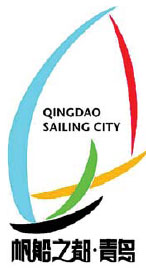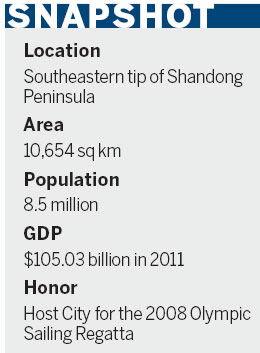|
Using its well-established industries and rich resources, the city aims to play a key role in marine economic development. Photos provided to China Daily |
Qingdao in Shandong province has a thriving high-tech sector much like that of California's Silicon Valley or Bangalore, India, but local officials say the city has one advantage those regions lack: a wealth of marine resources.
When the Shandong peninsula's "blue economic zone" was integrated into the national development strategy in January 2011, Qingdao set out to become the center of international marine science and technological development, a national demonstration site, and a force to drive the peninsula's blue economic zone.
"Marine industries will play a leading role in the city's economic growth, and a stronger blue economic sector will enhance Qingdao's position as one of the nation's first-tier cities," said Li Qun, Qingdao Party chief and member of the standing committee of the Shandong Party committee.
"Qingdao will concentrate on marine industries to achieve a leap forward," Li added.

Qingdao boasts rich marine resources. It has 711 kilometers of coastline, some 50 bays and nearly 70 islands, as well as a total ocean area of 122,000 square kilometers.
Qingdao has nearly 30 marine research institutes and schools, accounting for one-third of the nation's total. These facilities are home to 19 academicians from the Chinese Academy of Sciences and the Chinese Academy of Engineering who are top experts in the field of ocean studies.
There are also 20 key oceanography labs and seven large oceanographic research ships, each of which weighs more than 1,000 tons.
Using the city's rich resources, local authorities plan to turn the city into a "blue Silicon Valley" in the east, with a focus on research in high-tech sectors in ocean-related industries.
The core areas of the valley are located in the Laoshan district and Jimo county, including a 5-square-kilometer area for a cluster of marine science and technology research bases.
Construction on a series of new projects is underway, including a national base for deep ocean research and a national lab for ocean science and technologies.
In addition, the New Economic Zone on West Jiaozhou Bay is also being planned and built to support the emerging ocean-related sector. The zone will focus on manufacturing and logistics .
The new zone will cover the current Huangdao district and Jiaonan county. It will include a number of economic and development zones as well as a bonded zone and an export-processing zone. The Qingdao Qianwan Port Area and the Dongjiakou Port Area will also be included.

The economic zone "will help optimize resources and upgrade the industrial structure of the city," Li said.
In 2011 the city's entire ocean-related industry contributed 189 billion yuan to local GDP, up 12.3 percent compared with the previous year.
Local leaders expect marine enterprises to generate 115 billion yuan in annual GDP by 2015, with an estimated average growth rate of 16 percent. The target for 2020 is 220 billion yuan .
Qingdao is the largest base for shipbuilding and the production of marine equipment in Asia. The port city provides a link among a number of industry chains, such as shipbuilding and repair, diesel engine manufacturing, and marine engineering equipment.
There is also a base for the biological technology industry in the city, and it is the only one in the nation specializing in marine organisms.
As an international transportation and logistics hub, the city has opened itself to 108 airlines. The ports of Qingdao handled 372 million tons of cargo in 2011, ranking seventh worldwide, and more than 12 million cargo containers, ranking eighth.
You may contact the writers at [email protected] and [email protected]
|
Photo shows a national deep-ocean base under construction in Qingdao. |
(China Daily 03/07/2012 page24)
